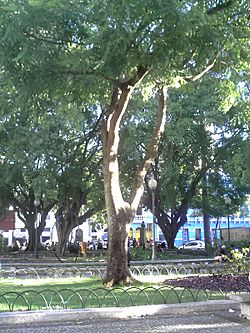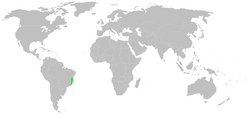Brazilwood facts for kids
Quick facts for kids Brazilwood |
|
|---|---|
 |
|
| Conservation status | |
| Scientific classification | |
| Kingdom: | |
| Division: | |
| Class: | |
| Order: | |
| Family: | |
| Subfamily: | |
| Genus: |
Caesalpinia
|
| Binomial name | |
| Caesalpinia echinata |
|
 |
|
| natural range | |
Brazilwood (also called Pau-Brasil or Pernambuco wood) is a special tree from Brazil. Its scientific name is Caesalpinia echinata. This tree is famous for its strong, orange-red wood. The wood can be polished to a beautiful shine.
Brazilwood is the best wood for making bows for musical instruments. These include instruments like the violin, cello, and double bass. The wood also produces a natural red dye called brazilin. This dye was very important a long time ago.
There are other trees in the same plant family that are similar. They can also produce red dye. Sometimes, the name "brazilwood" is used for these other trees too. In the 1700s, people harvested a lot of brazilwood for its dye. Because of this, the tree is now rare in many places where it used to grow.
When Pedro Álvares Cabral first explored Brazil, he named the country after this very tree.
Contents
More About Brazilwood
Why is Brazilwood Special?
Brazilwood is known for its amazing qualities. Its wood is very dense and strong. This makes it perfect for crafting high-quality musical bows. The wood's natural orange-red color is also very beautiful.
The Famous Red Dye
The red dye from brazilwood is called brazilin. For many years, this dye was used to color fabrics. It was a very valuable product. People would trade it across the world.
Where Does it Grow?
Brazilwood trees are native to the Atlantic Forest in Brazil. This forest runs along the coast of Brazil. The trees prefer warm, humid climates. They can grow quite tall, reaching up to 30 meters (about 98 feet).
Protecting Brazilwood
Because so much brazilwood was cut down, it is now an endangered species. This means it is at risk of disappearing forever. Many groups are working to protect these trees. They plant new trees and try to stop illegal logging. It's important to save brazilwood for future generations.
Images for kids
See also
 In Spanish: Palo brasil para niños
In Spanish: Palo brasil para niños





